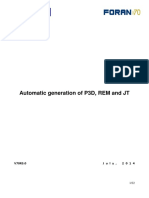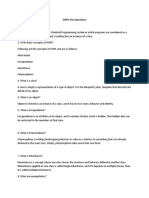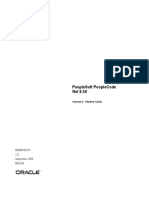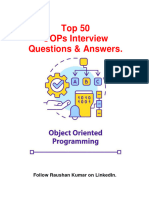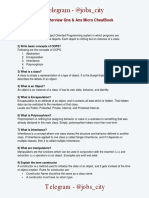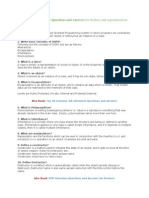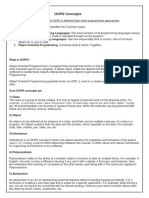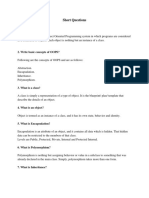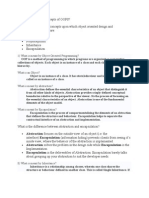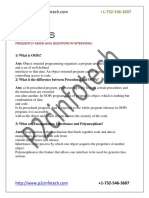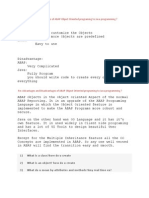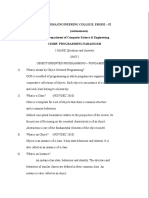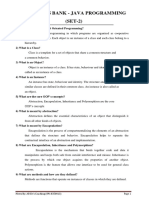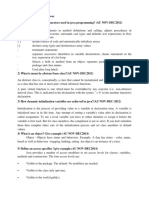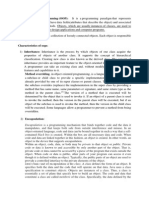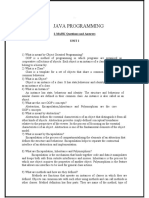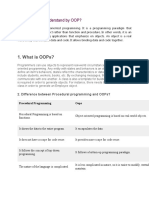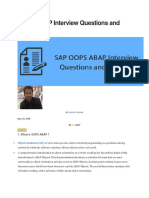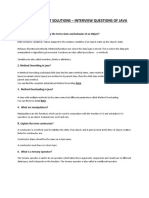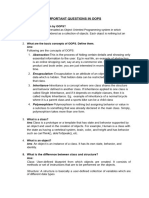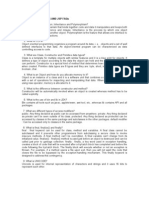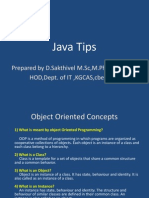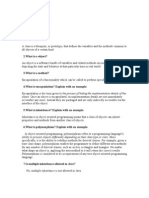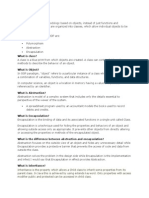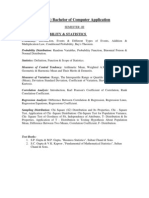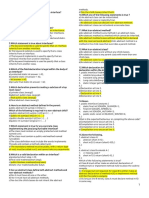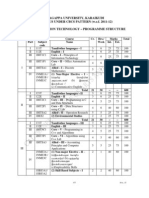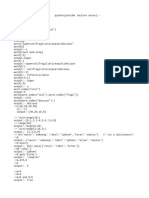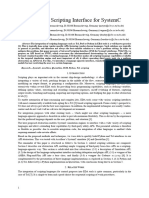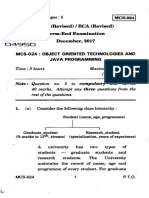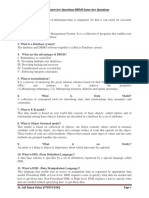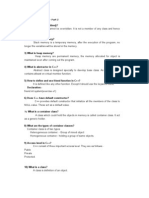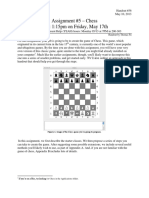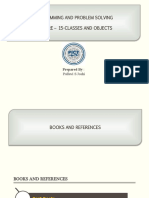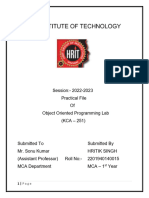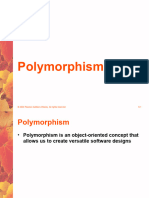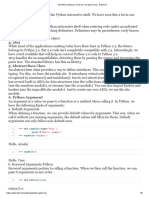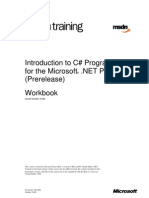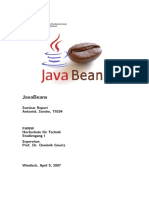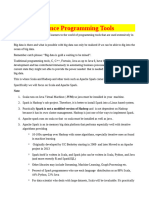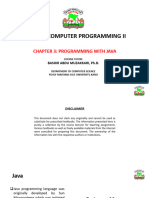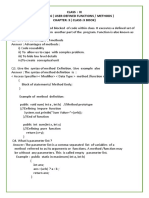6 Programming Languages
6 Programming Languages
Uploaded by
srinivasa rajuCopyright:
Available Formats
6 Programming Languages
6 Programming Languages
Uploaded by
srinivasa rajuOriginal Description:
Copyright
Available Formats
Share this document
Did you find this document useful?
Is this content inappropriate?
Copyright:
Available Formats
6 Programming Languages
6 Programming Languages
Uploaded by
srinivasa rajuCopyright:
Available Formats
“AtoZ Telugu News”- Mobile App.
✓ పో టీపరీక్షలకు ప్రిప్ేరయ్యే అభ్ేరధులకు "AtoZ Telugu News" App చాలా ఉపయోగపడుత ుంది. ఈ
APP లో పితిరోజు LATEST JOBS, డైలీ Curent Affairs, ఎపపటికపపపడు జరిగే మొతత ుం విదాే
సమాచారాన్ని ఈ APP లో UPDATE చేసత త ఉుంటాము.
✓ ఇుంకా ఎపపటికపపపడు మీ చుటటుపకకల జరిగే తాజా వారత లను కూడా చతడవచుు. ఇపపడే మా App
ను Download చేసుక ుండి.
➢ App Link:
https://play.google.com/store/apps/details?id=com.app.atoznews
Programming Languages- OOPS concepts
1) What is OOPS?
OOPS is abbreviated as Object Oriented Programming system in which programs are
considered as a collection of objects. Each object is nothing but an instance of a class.
2) Write basic concepts of OOPS?
Following are the concepts of OOPS:
1. Abstraction
2. Encapsulation
3. Inheritance
4. Polymorphism
3) What is a class?
A class is simply a representation of a type of object. It is the blueprint/plan/template
that describes the details of an object.
4) What is an Object?
An object is an instance of a class. It has its own state, behavior, and identity.
5) What is Encapsulation?
Encapsulation is an attribute of an object, and it contains all data which is hidden. That
hidden data can be restricted to the members of that class.
Levels are Public, Protected, Private, Internal, and Protected Internal.
6) What is Polymorphism?
Polymorphism is nothing but assigning behavior or value in a subclass to something
that was already declared in the main class. Simply, polymorphism takes more than one
form.
“AtoZ Telugu News- Mobile App”
7) What is Inheritance?
Inheritance is a concept where one class shares the structure and behavior defined in
another class. If Inheritance applied to one class is called Single Inheritance, and if it
depends on multiple classes, then it is called multiple Inheritance.
8) What are manipulators?
Manipulators are the functions which can be used in conjunction with the insertion (<<)
and extraction (>>) operators on an object. Examples are endl and setw.
9) Explain the term constructor
A constructor is a method used to initialize the state of an object, and it gets invoked at
the time of object creation. Rules for constructor are:
• Constructor Name should be the same as a class name.
• A constructor must have no return type.
10) Define Destructor?
A destructor is a method which is automatically called when the object is made of scope
or destroyed. Destructor name is also same as class name but with the tilde symbol
before the name.
11) What is an Inline function?
An inline function is a technique used by the compilers and instructs to insert complete
body of the function wherever that function is used in the program source code.
12) What is a virtual function?
A virtual function is a member function of a class, and its functionality can be overridden
in its derived class. This function can be implemented by using a keyword called virtual,
and it can be given during function declaration.
A virtual function can be declared using a token(virtual) in C++. It can be achieved in
C/Python Language by using function pointers or pointers to function.
13) What is a friend function?
A friend function is a friend of a class that is allowed to access to Public, private, or
protected data in that same class. If the function is defined outside the class cannot
access such information.
A friend can be declared anywhere in the class declaration, and it cannot be affected by
access control keywords like private, public, or protected.
14) What is function overloading?
Function overloading is a regular function, but it can perform different tasks. It allows the
creation of several methods with the same name which differ from each other by the
type of input and output of the function.
Example
void add(int& a, int& b);
“AtoZ Telugu News- Mobile App”
void add(double& a, double& b);
void add(struct bob& a, struct bob& b);
15) What is operator overloading?
Operator overloading is a function where different operators are applied and depends
on the arguments. Operator,-,* can be used to pass through the function, and it has its
own precedence to execute
16) What is an abstract class?
An abstract class is a class which cannot be instantiated. Creation of an object is not
possible with an abstract class, but it can be inherited. An abstract class can contain
only an Abstract method. Java allows only abstract method in abstract class while other
languages allow non-abstract method as well.
17) What is a ternary operator?
The ternary operator is said to be an operator which takes three arguments. Arguments
and results are of different data types, and it depends on the function. The ternary
operator is also called a conditional operator.
18) What is the use of finalize method?
Finalize method helps to perform cleanup operations on the resources which are not
currently used. Finalize method is protected, and it is accessible only through this class
or by a derived class.
19) What are the different types of arguments?
A parameter is a variable used during the declaration of the function or subroutine, and
arguments are passed to the function body, and it should match with the parameter
defined. There are two types of Arguments.
• Call by Value – Value passed will get modified only inside the function, and it returns the
same value whatever it is passed into the function.
• Call by Reference – Value passed will get modified in both inside and outside the
functions and it returns the same or different value.
20) What is the super keyword?
The super keyword is used to invoke the overridden method, which overrides one of its
superclass methods. This keyword allows to access overridden methods and also to
access hidden members of the superclass.
It also forwards a call from a constructor, to a constructor in the superclass.
21) What is method overriding?
Method overriding is a feature that allows a subclass to provide the implementation of a
method that overrides in the main class. It will override the implementation in the
“AtoZ Telugu News- Mobile App”
superclass by providing the same method name, same parameter, and same return
type.
22) What is an interface?
An interface is a collection of an abstract method. If the class implements an interface, it
thereby inherits all the abstract methods of an interface.
Java uses Interface to implement multiple inheritances.
23) What is exception handling?
An exception is an event that occurs during the execution of a program. Exceptions can
be of any type – Runtime exception, Error exceptions. Those exceptions are adequately
handled through exception handling mechanism like try, catch, and throw keywords.
24) What are tokens?
A compiler recognizes a token, and it cannot be broken down into component elements.
Keywords, identifiers, constants, string literals, and operators are examples of tokens.
Even punctuation characters are also considered as tokens. Example: Brackets,
Commas, Braces, and Parentheses.
25) What is the main difference between overloading
and overriding?
Overloading is static Binding, whereas Overriding is dynamic Binding. Overloading is
nothing but the same method with different arguments, and it may or may not return the
equal value in the same class itself.
Overriding is the same method names with the same arguments and return types
associated with the class and its child class.
26) What is the main difference between a class and
an object?
An object is an instance of a class. Objects hold multiple information, but classes don’t
have any information. Definition of properties and functions can be done in class and
can be used by the object.
A class can have sub-classes, while an object doesn’t have sub-objects.
27) What is an abstraction?
Abstraction is a useful feature of OOPS, and it shows only the necessary details to the
client of an object. Meaning, it shows only required details for an object, not the inner
constructors, of an object. Example – When you want to switch on the television, it is
not necessary to know the inner circuitry/mechanism needed to switch on the TV.
Whatever is required to switch on TV will be shown by using an abstract class.
28) What are the access modifiers?
Access modifiers determine the scope of the method or variables that can be accessed
from other various objects or classes. There are five types of access modifiers, and they
are as follows:
“AtoZ Telugu News- Mobile App”
• Private
• Protected
• Public
• Friend
• Protected Friend
29) What are sealed modifiers?
Sealed modifiers are the access modifiers where the methods can not inherit it. Sealed
modifiers can also be applied to properties, events, and methods. This modifier cannot
be used to static members.
30) How can we call the base method without creating
an instance?
Yes, it is possible to call the base method without creating an instance. And that method
should be “Static method.”
Doing Inheritance from that class.-Use Base Keyword from a derived class.
31) What is the difference between new and override?
The new modifier instructs the compiler to use the new implementation instead of the
base class function. Whereas, Override modifier helps to override the base class
function.
32) What are the various types of constructors?
There are three types of constructors:
– Default Constructor – With no parameters.
– Parametric Constructor – With Parameters. Create a new instance of a class and
also passing arguments simultaneously.
– Copy Constructor – Which creates a new object as a copy of an existing object.
33) What is early and late Binding?
Early binding refers to the assignment of values to variables during design time,
whereas late Binding refers to the assignment of values to variables during run time.
34) What is ‘this’ pointer?
THIS pointer refers to the current object of a class. THIS keyword is used as a pointer
which differentiates between the current object with the global object. It refers to the
current object.
35) What is the difference between structure and a
class?
The default access type of a Structure is public, but class access type is private. A
structure is used for grouping data, whereas a class can be used for grouping data and
“AtoZ Telugu News- Mobile App”
methods. Structures are exclusively used for data, and it doesn’t require strict validation,
but classes are used to encapsulate and inherent data, which requires strict validation.
36) What is the default access modifier in a class?
The default access modifier of a class is Private by default.
37) What is a pure virtual function?
A pure virtual function is a function which can be overridden in the derived class but
cannot be defined. A virtual function can be declared as Pure by using the operator =0.
Example –
Virtual void function1() // Virtual, Not pure
Virtual void function2() = 0 //Pure virtual
38) What are all the operators that cannot be
overloaded?
Following are the operators that cannot be overloaded -.
1. Scope Resolution (::)
2. Member Selection (.)
3. Member selection through a pointer to function (.*)
39) What is dynamic or run time polymorphism?
Dynamic or Run time polymorphism is also known as method overriding in which call to
an overridden function is resolved during run time, not at the compile time. It means
having two or more methods with the same name, same signature but with different
implementation.
40) Do we require a parameter for constructors?
No, we do not require a parameter for constructors.
41) What is a copy constructor?
This is a special constructor for creating a new object as a copy of an existing object.
There will always be only one copy constructor that can be either defined by the user or
the system.
42) What does the keyword virtual represented in the
method definition?
It means we can override the method.
43) Whether static method can use nonstatic
members?
False.
“AtoZ Telugu News- Mobile App”
44) What are a base class, subclass, and superclass?
The base class is the most generalized class, and it is said to be a root class.
A Subclass is a class that inherits from one or more base classes.
The superclass is the parent class from which another class inherits.
45) What is static and dynamic Binding?
Binding is nothing but the association of a name with the class. Static Binding is a
binding in which name can be associated with the class during compilation time, and it
is also called as early Binding.
Dynamic Binding is a binding in which name can be associated with the class during
execution time, and it is also called as Late Binding.
46) How many instances can be created for an
abstract class?
Zero instances will be created for an abstract class. In other words, you cannot create
an instance of an Abstract Class.
47) Which keyword can be used for overloading?
Operator keyword is used for overloading.
48) What is the default access specifier in a class
definition?
Private access specifier is used in a class definition.
49) Which OOPS concept is used as a reuse
mechanism?
Inheritance is the OOPS concept that can be used as a reuse mechanism.
50) Which OOPS concept exposes only the necessary
information to the calling functions?
Encapsulation
C fundamendals…….Multiple Choice questions
1. C++ provides various types of …………………… tokens that includes keywords,
identifiers, constants, strings and operators.
A) tokens
B) expressions
C) structures
D) none
“AtoZ Telugu News- Mobile App”
Answer;A
2. …………………. refer to the names of variables, functions, arrays, classes etc.
created by programmer.
A) Keywords
B) Identifiers
C) Constants
D) Strings
ANSWER:B
3………………….. are explicitly reserved identifiers and cannot be used as names for
the program variables or other user defined program elements.
A) Keywords
B) Identifiers
C) Constants
D) Strings
ANSWER:A
4. State whether the following statements are True or False for C++ identifiers.
i) Only alphabetic characters, digits and underscores are permitted.
ii) The name can start with a digit.
iii) Uppercase and lowercase letters are distinct.
A) i-True, ii-True, iii-False
B) i-True, ii-False, iii-True
C) i-True, ii-False, iii-False
D) i-True, ii-True, iii-True
ANSWER; B
5. In C++, ………………….. refer to fixed values that do not change during the
execution of a program.
A) Identifiers
B) Constants
C) Strings
D) Operators
ANSWER: B
6. C++ provdes an additional use of …………………….., for declaration of generic
pointers.
A) int
“AtoZ Telugu News- Mobile App”
B) float
C) void
D) double
ANSWER: C
7. The ……………………. data type was used to specify the return type of a function
when it is not returning any value.
A) int
B) float
C) void
D) double
ANSWER:C
8. A ………………….. can be assigned a pointer value of any basic data type, but it may
not de-referenced.
A) int pointer
B) void pointer
C) generic pointer
D) non-void pointer
ANSWER:C
9. Which of the following is NOT the user defined data type in C++.
A) Structure
B) Pointer
C) Union
D) Class
ANSWER;B
10. Which of the following is/are the derived data types in C++.
i) array ii) function iii) pointer iv) class
A) i, ii and iii only
B) ii, iii and iv only
C) i, iii and iv only
D) All i, ii, iii and iv
ANSWER:A
11. In the case of ……………………… in C++, we can not modify the address that the
pointer is initialized.
“AtoZ Telugu News- Mobile App”
A) constant pointer
B) pointer to a constant
C) pointer constant
D) constant to a pointer
ANSWER: A
12. In the case of ………………………. in C++, contents of what it points to cannot be
changed.
A) constant pointer
B) pointer to a constant
C) pointer constant
D) constant to a pointer
ANSWER:B
13. Which of the following is the correct way of declaring constant pointer in C++.
A) char const * pointer1=”OK”;
B) char * const pointer1=”OK”;
C) const * char pointer1=”OK”;
D) const char * pointer1=”OK”;
ANSWER: B
14. Which of the following is the correct way of declaring pointer to a constant in C++.
A) int * const pointer1=&p;
B) const * int pointer1=&p;
C) int const * pointer1=&p;
D) int pointer1 * const=&p;
ANSWER: C
15. We can create …………………….. in C++ using the qualifier constant and defining a
set of integer constant using enum keywords.
A) basic constant
B) number constant
C) symbolic constant
D) named constant
ANSWER;C
“AtoZ Telugu News- Mobile App”
16. The …………………… are just like variables except that their values cannot be
changed.
A) basic constant
B) number constant
C) symbolic constant
D) named constant
ANSWER;D
17. ………………… are widely used in C++ for memory management and to achieve
polymorphism.
A) Pointers
B) Array
C) Function
D) Class
ANSWER;A
18. C++ permits initialization of the variables at run time which is referred to as
………………. initialization.
A) static
B) dynamic
C) variable
D) runtime
ANSWER:B
19. …………………….. used in C++ provides an alias (alternative name) for a
previously defined variables.
A) alias
B) alternative
C) defined
D) reference
ANSWER;D
20. A reference variable must be initialized at the time of ………………………………
A) initialization
B) declaration
C) running
D) definition
ANSWER;B
“AtoZ Telugu News- Mobile App”
………………………………………………………..THE END………………………………………
“AtoZ Telugu News- Mobile App”
You might also like
- Foran User GuideDocument22 pagesForan User GuidebobaiboyNo ratings yet
- Training Assignments: Java Se 8 Programming LanguageDocument6 pagesTraining Assignments: Java Se 8 Programming LanguageNguyen Dang Hung (K13HN)No ratings yet
- Top 50 OOPs Interview Questions & AnswersDocument7 pagesTop 50 OOPs Interview Questions & AnswersDeepak Kumar KannaujiyaNo ratings yet
- OOPS Viva QuestionsDocument8 pagesOOPS Viva QuestionsPunithadevi100% (3)
- PeopleSoft PeopleCode Rel 8.50 - Volume II - Student Guide (2009-09 D62734)Document290 pagesPeopleSoft PeopleCode Rel 8.50 - Volume II - Student Guide (2009-09 D62734)Peter LeonovNo ratings yet
- Repost Oops Interview? ? QnA?Document12 pagesRepost Oops Interview? ? QnA?Timothy King LincolnNo ratings yet
- 50+ OOP Interview QuestionsDocument12 pages50+ OOP Interview QuestionsMsairam MNo ratings yet
- DSA Unit I 2 MarksDocument11 pagesDSA Unit I 2 MarksarunNo ratings yet
- Telegram - @jobs - City: Oops Interview Qns & Ans Micro CheatbookDocument4 pagesTelegram - @jobs - City: Oops Interview Qns & Ans Micro CheatbookMaheswarreddy YarragonduNo ratings yet
- Object Oriented Programming Viva Questions: 1) What Is OOPS?Document7 pagesObject Oriented Programming Viva Questions: 1) What Is OOPS?Tush VaralNo ratings yet
- OOPs Concept Technical Round CheatBookDocument4 pagesOOPs Concept Technical Round CheatBookShivani KhurudNo ratings yet
- Wrapping States and Behaviour Is Called EncapsulationDocument5 pagesWrapping States and Behaviour Is Called EncapsulationJijitha MjNo ratings yet
- Top 50 Oops Interview QuestionsDocument8 pagesTop 50 Oops Interview QuestionsShrey sharmaNo ratings yet
- Top 50 Oops Interview Questions & AnswersDocument8 pagesTop 50 Oops Interview Questions & AnswersSudhanshu RanjanNo ratings yet
- Top 50 Oops Questions & AnswersDocument7 pagesTop 50 Oops Questions & AnswersAhmad MahmoodNo ratings yet
- OOPs Short QuestionsDocument55 pagesOOPs Short QuestionsArtificial Intelligence ScientistNo ratings yet
- Oop QuestionsDocument6 pagesOop QuestionsNicoleta CoroceaNo ratings yet
- Top 50 OOPs Interview Questions and AnswersDocument6 pagesTop 50 OOPs Interview Questions and AnswersBernard DiacNo ratings yet
- 50Q OopDocument14 pages50Q OopMahmoud ElsawyNo ratings yet
- Oops Question BankDocument25 pagesOops Question BankLokesh Tejveer SinghNo ratings yet
- Base Base Publicmember Base Protectedmember Base PrivatememberDocument11 pagesBase Base Publicmember Base Protectedmember Base PrivatememberMuhammad IbrarNo ratings yet
- OOPS ConceptsDocument9 pagesOOPS ConceptsVijay ChikkalaNo ratings yet
- OOP Question For The InterviewDocument8 pagesOOP Question For The InterviewAhmed khaledNo ratings yet
- Short Questions: 1. What Is OOPS?Document9 pagesShort Questions: 1. What Is OOPS?Waseem AbbasNo ratings yet
- OOP Viva QuestionsDocument8 pagesOOP Viva QuestionsRaza Khawar0% (1)
- Core Java & Servlet & JSP &JDBCDocument70 pagesCore Java & Servlet & JSP &JDBCKrish GNo ratings yet
- 2 MarksDocument3 pages2 MarkskarthicknationNo ratings yet
- C++ Notes by Yatendra KashyapDocument7 pagesC++ Notes by Yatendra Kashyapyatendra kashyap0% (2)
- Top 50 Oops Interview Questions and Answers: Java PDF C# PDF C++ Programming Java ProgrammingDocument7 pagesTop 50 Oops Interview Questions and Answers: Java PDF C# PDF C++ Programming Java Programmingricky patealNo ratings yet
- Compile Time Polymorphism: Compile Time Polymorphism Means CompilerDocument5 pagesCompile Time Polymorphism: Compile Time Polymorphism Means CompilerHrishikesh SinghNo ratings yet
- Frequently Asked Java Questions in InterviewsDocument5 pagesFrequently Asked Java Questions in InterviewsParas PareekNo ratings yet
- Frequently Asked Java Questions in InterviewsDocument5 pagesFrequently Asked Java Questions in InterviewsParv khatriNo ratings yet
- Ooabap Interview QuestionsDocument9 pagesOoabap Interview Questionsanil4121No ratings yet
- Nandha Engineering College, Erode - 52 (Autonomous) Department of Computer Science & Engineering Cs2305-Programming ParadigmsDocument34 pagesNandha Engineering College, Erode - 52 (Autonomous) Department of Computer Science & Engineering Cs2305-Programming ParadigmsparvathiNo ratings yet
- Oops QueationsDocument13 pagesOops QueationsAravind AnilNo ratings yet
- Core Java Question Bank (Set-2)Document11 pagesCore Java Question Bank (Set-2)Amitav Biswas100% (1)
- Unit-2 2 MarksDocument5 pagesUnit-2 2 MarksbvarsshaNo ratings yet
- Object-Oriented Programming (OOP) : It Is A Programming Paradigm That RepresentsDocument10 pagesObject-Oriented Programming (OOP) : It Is A Programming Paradigm That Representstiny_nithNo ratings yet
- Computer Application Basic Questions: 1 What Is C Language?Document19 pagesComputer Application Basic Questions: 1 What Is C Language?Anonymous ggv2kmZFA4No ratings yet
- Mailam Engineering College Oop-Cs8392 - Unit - IDocument79 pagesMailam Engineering College Oop-Cs8392 - Unit - IVasantha chandrakala RNo ratings yet
- Master List of Java Interview Questions 115 QuestionsDocument22 pagesMaster List of Java Interview Questions 115 QuestionsPremendra KumarNo ratings yet
- Overview of OOP: Network System Level-7Document26 pagesOverview of OOP: Network System Level-7kawther abassNo ratings yet
- Java 2marks Questions With AnswerDocument19 pagesJava 2marks Questions With AnswerNandhu RTNo ratings yet
- Some Important Faqs On JavaDocument15 pagesSome Important Faqs On JavaSrinivas CharyNo ratings yet
- 25 Most Important Interview Qus &ans: Sumit PandeyDocument6 pages25 Most Important Interview Qus &ans: Sumit Pandeyحياة المبرمجNo ratings yet
- What Is Oops?: 1) What Do You Understand by Oop?Document19 pagesWhat Is Oops?: 1) What Do You Understand by Oop?Sakshi ChidarNo ratings yet
- OOPS ABAP Interview Questions and AnswersDocument13 pagesOOPS ABAP Interview Questions and Answersshekhar sumanNo ratings yet
- CS8651 - Ip - 2 Marks With AnswersDocument65 pagesCS8651 - Ip - 2 Marks With AnswersMariaMichaelVisuwasam0% (1)
- Webperco Soft Solutions - Interview Questions of JavaDocument4 pagesWebperco Soft Solutions - Interview Questions of JavaHR Webperco Soft SolutionsNo ratings yet
- Oops For Cse - It Gdpi 2021Document6 pagesOops For Cse - It Gdpi 2021Khushi BerryNo ratings yet
- JAVA Short Question AnswerDocument9 pagesJAVA Short Question AnswerWaseem AbbasNo ratings yet
- Java, JDBC, Servlets and JSP FaqsDocument12 pagesJava, JDBC, Servlets and JSP FaqssanthoshkarthikNo ratings yet
- Java Tips: Prepared by D.Sakthivel M.SC, M.Phil, MBA HOD, Dept. of IT, KGCAS, CbeDocument31 pagesJava Tips: Prepared by D.Sakthivel M.SC, M.Phil, MBA HOD, Dept. of IT, KGCAS, CbeJustin GomezNo ratings yet
- Tecnical QuestionDocument7 pagesTecnical QuestionDavid DominguezNo ratings yet
- JavanotesDocument134 pagesJavanotesMAYANK RAGHAVNo ratings yet
- Two? The Modifier Static Can Be Used With A Variable and Method. When Declared AsDocument9 pagesTwo? The Modifier Static Can Be Used With A Variable and Method. When Declared AsratnalajagguNo ratings yet
- IT2301 JavaDocument31 pagesIT2301 JavakirthisaralaNo ratings yet
- Oop-Java Interview QuestionDocument8 pagesOop-Java Interview Questionwaqasar007No ratings yet
- Python Projects for Beginners: Part 4. Object-Oriented Programming (OOP). Get an introduction to OOP concepts such as classes, objects, inheritance, and polymorphismFrom EverandPython Projects for Beginners: Part 4. Object-Oriented Programming (OOP). Get an introduction to OOP concepts such as classes, objects, inheritance, and polymorphismNo ratings yet
- Bca Syllabus Sem 3Document9 pagesBca Syllabus Sem 3Ashiqur Rahman TonmoyNo ratings yet
- Core JavaDocument42 pagesCore JavaGOWRI MNo ratings yet
- Python PPT 03Document54 pagesPython PPT 03supriya mandalNo ratings yet
- Alagappa University, Karaikudi SYLLABUS UNDER CBCS PATTERN (W.e.f. 2011-12) B.SC., Information Technology - Programme StructureDocument30 pagesAlagappa University, Karaikudi SYLLABUS UNDER CBCS PATTERN (W.e.f. 2011-12) B.SC., Information Technology - Programme StructureMathan NaganNo ratings yet
- PythonDocument16 pagesPythonsajal agarwalNo ratings yet
- DVCon Europe 2015 TA3 1 PaperDocument8 pagesDVCon Europe 2015 TA3 1 PaperJon DCNo ratings yet
- Download ebooks file (eBook PDF) Microsoft Visual C#: An Introduction to Object-Oriented Programming 7th Edition all chaptersDocument49 pagesDownload ebooks file (eBook PDF) Microsoft Visual C#: An Introduction to Object-Oriented Programming 7th Edition all chapterstracheznahor89No ratings yet
- Mcs 024Document5 pagesMcs 024shanibaNo ratings yet
- DBMS Interview Questions-DBMS Interview Questions: Dr. Anil Kumar Dubey (9783934206)Document41 pagesDBMS Interview Questions-DBMS Interview Questions: Dr. Anil Kumar Dubey (9783934206)Anil Kumar DubeyNo ratings yet
- C++ Interview QuesDocument3 pagesC++ Interview QuesMurali AathiNo ratings yet
- Java Chess ProgrammDocument25 pagesJava Chess ProgrammShaheer AliNo ratings yet
- Programming and Problem Solving Lecture - 15-Classes and ObjectsDocument44 pagesProgramming and Problem Solving Lecture - 15-Classes and Objectsatharva somanNo ratings yet
- Java File HritikDocument35 pagesJava File Hritikmahender9891No ratings yet
- Final ProjectDocument45 pagesFinal Projectsamidabala2No ratings yet
- 7 PolymorphismDocument30 pages7 PolymorphismFaras Rama MahadikaNo ratings yet
- 59 Python Glossary of Terms You Must Know - DataFlairDocument8 pages59 Python Glossary of Terms You Must Know - DataFlairAyushGourNo ratings yet
- EIE3320 Tut01 JavaSyntaxDocument3 pagesEIE3320 Tut01 JavaSyntaxpeter chan100% (1)
- Unit Testing With CppUnitDocument18 pagesUnit Testing With CppUnitkushwaha.neeluNo ratings yet
- CSharp - Introduction To C# Programming For The Microsoft - Net Platform Pre Release)Document12 pagesCSharp - Introduction To C# Programming For The Microsoft - Net Platform Pre Release)manis0249228100% (3)
- School System FileDocument60 pagesSchool System FileSaumya SaumyaNo ratings yet
- Java BeansDocument24 pagesJava BeansVijay RaghavanNo ratings yet
- Object Oriented Programming With C PDFDocument24 pagesObject Oriented Programming With C PDFDeepikaNo ratings yet
- Introduction Data Science Programming Handout Set 1ADocument53 pagesIntroduction Data Science Programming Handout Set 1Adinoda6464No ratings yet
- Guice 1.0 User's GuideDocument22 pagesGuice 1.0 User's GuideerickgugoNo ratings yet
- PRELIM EXAM - UGRD-CS6203C Object Oriented ProgrammingDocument18 pagesPRELIM EXAM - UGRD-CS6203C Object Oriented Programmingyhu FULNo ratings yet
- JAVA Chapter3 Lecture NotesDocument55 pagesJAVA Chapter3 Lecture Notesibraheemyusuf04No ratings yet
- Class 9 Computer Chapter - 6 & 3 (Functions)Document4 pagesClass 9 Computer Chapter - 6 & 3 (Functions)Mamata BiswasNo ratings yet
